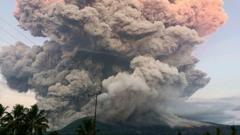As tensions flare between Israel and Iran, President Trump escalates rhetoric demanding Iran's unconditional surrender, raising concerns of U.S. military involvement in the conflict.**
Trump Calls for Total Surrender from Iran Amid Escalating Conflict**

Trump Calls for Total Surrender from Iran Amid Escalating Conflict**
President Trump's firm stance on Iran intensifies as he hints at U.S. military support for Israel's ongoing strikes.**
June 17, 2025, 2:24 p.m. ET
In an alarming turn of events, President Trump issued a strong ultimatum demanding Iran's "unconditional surrender" as military strikes escalate across the region. Trump's recent statements, made via social media, suggest a potential shift in U.S. involvement amidst Israel’s vigorous bombings targeting Iranian military installations.
The conflict ignited last week when Israel commenced airstrikes against Iranian nuclear facilities, reportedly hoping to derail Tehran’s nuclear ambitions. Amidst this backdrop, Trump has aligned himself closely with Israel's defense strategy, declaring a complete U.S. air control over the Iranian airspace through his message. The president simultaneously mentioned Iranian Supreme Leader Ayatollah Ali Khamenei, asserting, “we know exactly where he is hiding,” while indicating defiance regarding his removal for now, adding a layer of uncertainty to the already complex circumstances.
As Israel continues to carry out significant military operations, demands for a robust U.S. military response have surfaced, driven by Israel's Prime Minister Benjamin Netanyahu's call for heavy bunkerbusting bombs to target crucial Iranian facilities, particularly at the deep underground Fordo nuclear site. Netanyahu contends that military actions are essential to safeguarding Israeli citizens and curtailing Iran's advancing nuclear program.
The Israeli military has conducted a series of airstrikes across Iran, neutralizing key military figures and capabilities, leading to severe repercussions. Reports cite over 200 casualties in Iran and ongoing missile strikes from Iran targeting Israeli territory, indicating that the violence has quickly spiraled out of control.
President Trump has facilitated discussions with his security team to consider America’s role during this escalating conflict. While he has historically taken a stance against foreign military entanglement, today's rhetoric suggests an evolving strategy as he demands Iran relinquish its nuclear ambitions decisively. In a statement, he underscored the urgency for a resolution, proclaiming, “an end, a real end, not a cease-fire,” implying that his administration seeks an unprecedented total capitulation from Iran.
On the ground in Iran, civilian reactions are wrought with fear and uncertainty. Many citizens have fled major urban centers as missile strikes intensify, leading to gas shortages and strained supplies. Eyewitness accounts reveal citizens scrambling for safety amid chaos and alarm, reinforcing fears of a protracted conflict that might destabilize the entire region.
Amidst these developments, international dynamics remain tense as regional powers assess the potential trajectory of this conflict. While U.S. involvement solidifies as a contentious issue, local attitudes toward conflict and governmental authority will further dictate the pathways ahead.
As President Trump navigates this critical juncture, observers inside and outside the White House remain watchful of further developments while hoping for an outcome that prevents deeper international strife.
In an alarming turn of events, President Trump issued a strong ultimatum demanding Iran's "unconditional surrender" as military strikes escalate across the region. Trump's recent statements, made via social media, suggest a potential shift in U.S. involvement amidst Israel’s vigorous bombings targeting Iranian military installations.
The conflict ignited last week when Israel commenced airstrikes against Iranian nuclear facilities, reportedly hoping to derail Tehran’s nuclear ambitions. Amidst this backdrop, Trump has aligned himself closely with Israel's defense strategy, declaring a complete U.S. air control over the Iranian airspace through his message. The president simultaneously mentioned Iranian Supreme Leader Ayatollah Ali Khamenei, asserting, “we know exactly where he is hiding,” while indicating defiance regarding his removal for now, adding a layer of uncertainty to the already complex circumstances.
As Israel continues to carry out significant military operations, demands for a robust U.S. military response have surfaced, driven by Israel's Prime Minister Benjamin Netanyahu's call for heavy bunkerbusting bombs to target crucial Iranian facilities, particularly at the deep underground Fordo nuclear site. Netanyahu contends that military actions are essential to safeguarding Israeli citizens and curtailing Iran's advancing nuclear program.
The Israeli military has conducted a series of airstrikes across Iran, neutralizing key military figures and capabilities, leading to severe repercussions. Reports cite over 200 casualties in Iran and ongoing missile strikes from Iran targeting Israeli territory, indicating that the violence has quickly spiraled out of control.
President Trump has facilitated discussions with his security team to consider America’s role during this escalating conflict. While he has historically taken a stance against foreign military entanglement, today's rhetoric suggests an evolving strategy as he demands Iran relinquish its nuclear ambitions decisively. In a statement, he underscored the urgency for a resolution, proclaiming, “an end, a real end, not a cease-fire,” implying that his administration seeks an unprecedented total capitulation from Iran.
On the ground in Iran, civilian reactions are wrought with fear and uncertainty. Many citizens have fled major urban centers as missile strikes intensify, leading to gas shortages and strained supplies. Eyewitness accounts reveal citizens scrambling for safety amid chaos and alarm, reinforcing fears of a protracted conflict that might destabilize the entire region.
Amidst these developments, international dynamics remain tense as regional powers assess the potential trajectory of this conflict. While U.S. involvement solidifies as a contentious issue, local attitudes toward conflict and governmental authority will further dictate the pathways ahead.
As President Trump navigates this critical juncture, observers inside and outside the White House remain watchful of further developments while hoping for an outcome that prevents deeper international strife.























